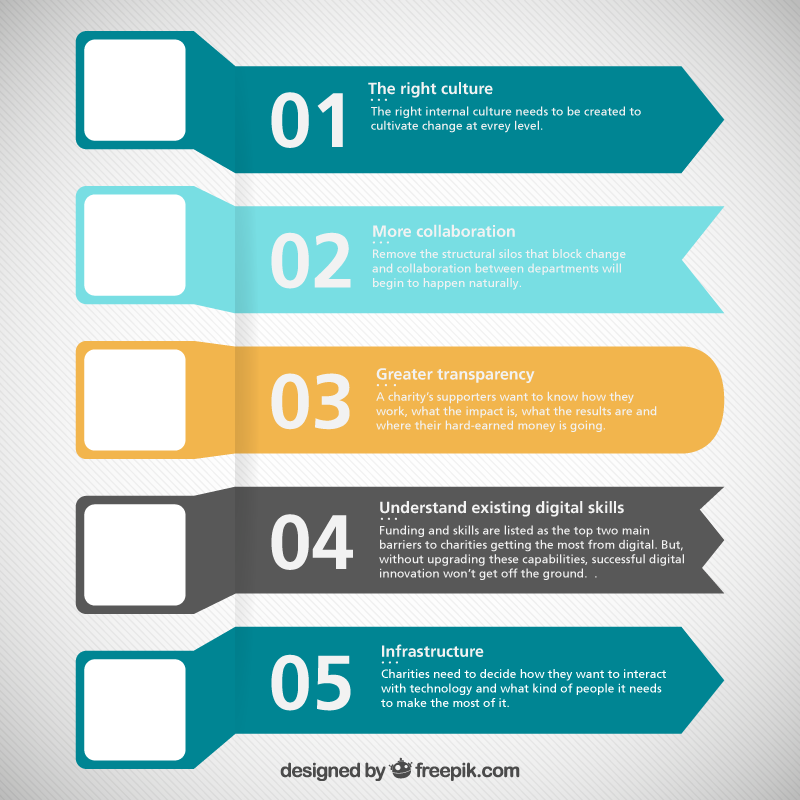In the Charity Digital Skills Report 2019 that was published this week, an overriding trend was how few charities have a clear strategy on how digital solutions can help them achieve their goals. As highlighted in the report, this means that “the vast majority of charities are still not aligning their digital and corporate strategies.”
What is encouraging, however, is that 67% of charities want to use digital over the next 12 months to increase their impact, whilst 59% want to use data more effectively. To ensure this can happen successfully, charities need to ensure that they have the foundations in place for successful digital transformation.
Before charities can realise the value of technology, there are cultural and infrastructure issues that need to be addressed. Years of trialling systems in silo and of departments working independently means that there is work that needs to be done to get the foundations in place for a powerful digital strategy. Here are some important areas for consideration:

5 considerations for charities on how to prepare for digital innovation
- The right culture
In the Charity Digital Skills Report 2019, culture came out as the third largest barrier to charities getting the most out of digital. It’s not all just about strategies, plans and processes. The success of digital innovation depends on the culture of the organisation. Charities that understand this will live and breathe their digital strategy. This isn’t something that can be dictated by one internal “digital pioneer”, instead the right internal culture needs to be created to cultivate change at every level. Even though this might not feel like successful digital innovation, through cultural change, organisations are laying the foundations for the future. Charities need to create an open, sharing culture where ideas and progress are welcomed, not stifled by existing systems and processes.
- More collaboration
Remove the structural silos that block change and collaboration between departments will begin to happen naturally. By involving the whole organisation, not just the IT department or digital team, every member of staff, from HR to marketing, will understand that a digital strategy can be an enabler for all.
- Greater transparency
That’s both internally and externally. Scrutiny for charities is the reality, but that doesn’t have to be a negative experience. Externally, supporters want to know how charities work, what the impact is, what the results are and where their hard-earned money is actually going. The answers lie in transparency and this relies on real time data, brought to life through stories. Internally, transparency between departments allows for greater collaboration.
- Understand existing digital skills
As detailed in the Charity Digital Skills Report 2019, 72% of charities believe that improving their digital skills would help them to save money and time. Funding and skills are listed as the top two main barriers to charities getting the most from digital. But, without upgrading these capabilities, from knowledge of social media marketing to the hiring of web developers and content producers, successful digital innovation won’t get off the ground.
- Infrastructure
The whole organisation needs to ask itself how it wants to interact with digital and what kind of people it needs to make the most of this technology. Many charities find that they have outgrown their internal IT systems which have become rigid and inflexible to the ever-changing demands of their organisation. Others work from countless updated spreadsheets that don’t link to each other.
Once the decision is made to digitally innovate and develop a strategy that revolutionises internal systems and services, charities need to look at effective solutions that can meet their requirements. Many are turning to dynamic and reliable CRM systems. From one central place, charities can build strategic marketing campaigns informed by data, report and track their fundraising performance, automate marketing activity and monitor social media conversations.
For further information about our NfP 365 CRM solution – which is based on Microsoft Dynamics 365 and tailored to the specific needs of charities – download our eBook on the “10 reasons charities choose Microsoft Dynamics 365 for managing supporter relationships.”

NfP Specialist
Connect
